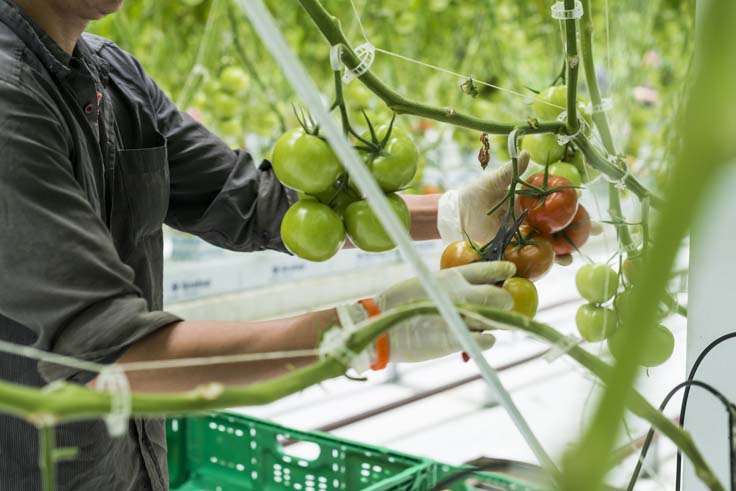For Tomatoes NZ, the A Lighter Touch (ALT) programme came along at exactly the right time, providing the vehicle to deliver the crop protection project their industry needed.
Tomatoes NZ board member Ben Smith, who is also General Manager of Growing at T&G Fresh, was involved in the product group’s decision to sign up to the A Lighter Touch programme, and says the opportunity couldn’t have come at a better time.
Following the arrival of the Tomato-Potato Psyllid (TPP) in New Zealand in the mid-2000s, glasshouse tomato growers were forced to revert from an integrated pest management (IPM) system to a largely chemical-based approach. The reintroduction of agrichemical sprays in greenhouses disrupted the performance of what had been the makings of a successful biocontrol of greenhouse whitefly (GHW) using parasitic wasps.
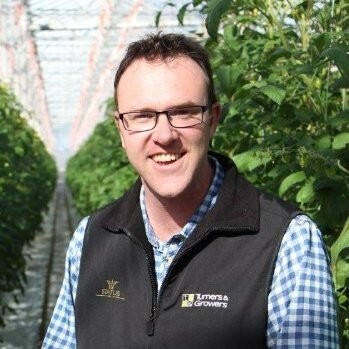
Tomatoes NZ board member Ben Smith.
While insecticides at that time, and throughout the 2010s, were effective against both TPP, and GHW, the industry knew it was only a matter of time before insecticide resistance was going to become a problem.
“We were dealing with whitefly, which is renowned as a champion of developing resistance, so we could see that problem building. As an industry we were continually working on this issue. To my mind, it’s probably been the most important pest on the industry’s agenda for all the time I’ve been a grower,” Ben says.
In their search for a solution, Tomatoes NZ talked to the apple industry about the work done in that sector to move from agrichemical-based crop protection to an IPM programme, and what was involved in taking growers on that journey.
“We didn’t have the scale of that industry, but we could see in terms of the process, that was the path we needed to follow.
“It was about that time A Lighter Touch came along. We were sitting there with a project put together in our minds, and we thought, A Lighter Touch is going to be the best vehicle to deliver this project through.”
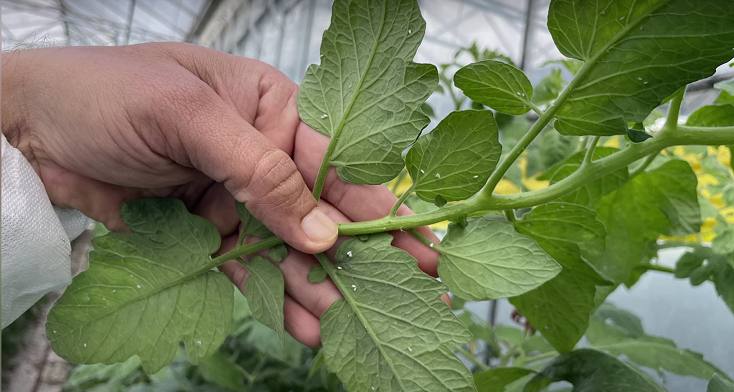
Greenhouse whitefly is one of the priority pests being targeted through Tomatoes NZ’s project with A Lighter Touch.
Ben says the government funding contribution that could be leveraged through A Lighter Touch was obviously a key element, but the collaboration aspect was another drawcard.
“Being in that space and having those conversations with other sectors in the industry and researchers was important to get a project like ours underway.”
The focus of the Tomatoes NZ-A Lighter Touch project is to enable the industry to return to an IPM system, centred on biological control of insect pests, using native or endemic beneficial insects to predate pest insects.
While the project still has two years to run, the results to date have already seen all large growers in New Zealand now using biologically-based pest control strategies, compared to 50% before the project started. Some small growers are also using biocontrols and there is a strong interest across the industry in the project.
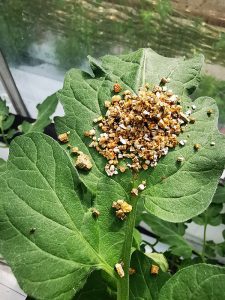
Vermiculite containing the beneficial insects on a tomato plant leaf. Photo credit Chris Thompson, Bioforce.
Ben sees the demonstrated change in crop protection practices in their industry as Tomatoes NZ’s main contribution to the programme, which other ALT product group partners and their growers will benefit from.
“We’re providing the example that apples provided for us, that an integrated pest management crop protection programme is achievable in a commercial environment.”
For growers, it’s a win-win, Ben says. It’s the most economic way forward, and there’s also the environmental benefits.
While tomato growers have historically been users of biocontrol technology, a focus of the ALT project is to ensure that the resources and tools rolled out to growers are robust and based on solid evidence from the demonstration work carried out through the project.
The sector is also aware that moving away from an agrichemical approach to biocontrol means other pests such as caterpillar and russet mite may well require more focused management in the future, but Ben is confident the work done through ALT provides a template for the industry to deal with future pest challenges.
“We know from overseas experience with biocontrol, it’s a case of working through the layers and solving one problem before moving on to the next. You don’t try and solve the whole equation all at once. With the knowledge we’ve gained so far through the project, we can see the light at the end of the tunnel.”
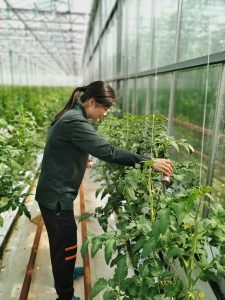
Jackie Bong from NZ Hothouse releasing the beneficial insects. Photo credit Chris Thompson, Bioforce.
Ben emphasises that the crop protection change tomato growers are making is an integrated approach, a mix of biocontrols and synthetic chemistry, not organic. As such the work A Lighter Touch has underway to seek efficiencies in the regulatory pathway for new crop protection products is an enduring outcome Tomatoes NZ is keen to see the programme deliver.
“We’re in this awkward position in New Zealand, where we have introduced pests, but not the introduced controls that go with them. As a country and as a crop, we’re too small to attract investment in new chemicals, and we need to improve the speed at which we have new products registered overseas approved for use here.”
